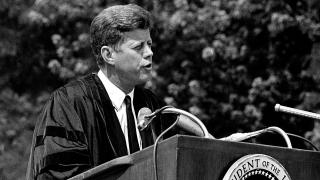June 17—The LaRouche movement has been on a campaign to revive the legacy of President John F. Kennedy—particularly his vision of a negotiated peace with the Soviet Union following near-disaster during the Cuban Missile Crisis. This took the form of a major online conference last weekend titled The World Needs JFK's Vision of Peace, which highlighted his famous "peace speech" of June 1963, and its implications for the world today—a world teetering on the brink of another, more dangerous, nuclear catastrophe.
A few months later, Kennedy spoke at the United Nations in September 1963, further advancing his concept of peace, and how to make it work. Referencing the extreme danger the world had recently experienced with the Cuban Missile Crisis, he stressed that the way forward for the US and Soviet Union was through cooperation, building "concrete collaborations for peace." "If either of our countries is to be fully secure, we need a much better weapon than the H-bomb—a weapon better than ballistic missiles or nuclear submarines—and that better weapon is peaceful cooperation," Kennedy said.
President Kennedy, who went on to emphasize that we must find areas of "mutual interest" as opposed to fixating on those areas of obvious disagreement, was outlining an entirely different policy—one that would establish relations among nations on the basis of our shared humanity, not simply on who is stronger or who shouts louder about the importance of their "values."
After proposing that the US and Soviet Union collaborate for a joint mission to the moon as the pillar to build a foundation of peace between our two nations, he said:
"All these and other new steps toward peaceful cooperation may be possible. Most of them will require on our part full consultation with our allies—for their interests are as much involved as our own, and we will not make an agreement at their expense. Most of them will require long and careful negotiation. And most of them will require a new approach to the cold war—a desire not to 'bury' one's adversary, but to compete in a host of peaceful arenas, in ideas, in production, and ultimately in service to all mankind."
How different was his view of statecraft! Consider this method of thinking applied to today: Why would the United States and other "developed" nations not collaborate whole-heartedly with China, Russia, India, and the broader BRICS, to incentivize economic growth worldwide? China eliminated extreme poverty entirely in a generation, why can't this be done in Africa, in Central and South America, or in Chicago?
Helga Zepp-LaRouche spoke of Kennedy's vision of peace in her webcast this week, and insisted that America must find its true spirit again, despite the attempt to silence it by his assassination and ensuing cover-up. "He had a clear idea of a vision for peace, not only just for America, but peace for the world, peace for all time."
Ironically, Kennedy's vision is coming true—just not in the West. Zepp-LaRouche went on to reference the fact that 151 nations are in the process of forming a new economic order, where the majority of the world is moving in the direction of cooperation and economic development, centered around the BRICS and China's Belt and Road Initiative. "Kennedy in a certain sense bridges that," she said, "because in his speech 60 years ago, he had a vision of the kind of world which is now emerging."
Instead, regimes of mass-censorship in the Western world are doing their utmost to stop it, including threatening thermonuclear annihilation (and imprisoning anyone who gets in their way). A shift must be made, a break must occur, and Kennedy's remarks indicate the potential lying within America that can and must be tapped into.






